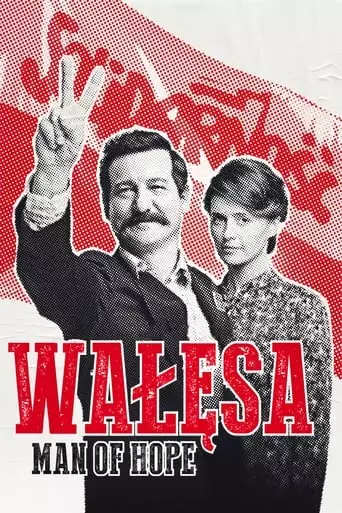
Walesa: Man of Hope (2013) Watch Online Free
How was it possible that a single man influenced contemporary world so significantly? This film is an attempt to capture the phenomenon of a common man’s metamorphosis into a charismatic leader — an attempt to see how a Gdansk shipyard electrician fighting for workers’ rights awakened a hidden desire for freedom in millions of people.
Walesa: Man of Hope (2013), directed by Andrzej Wajda, is a biographical film that chronicles the life of Lech Wałęsa, a pivotal figure in the fall of communism in Poland. The narrative unfolds through a series of flashbacks during an interview Wałęsa gave to an Italian journalist in the 1980s, recounting key moments of his life and his role in leading the Solidarity movement.
The film opens in the 1970s, when Wałęsa was a simple shipyard electrician in Gdańsk, Poland. It depicts his rise to prominence as he becomes a leader of the workers’ movement, eventually founding the Solidarity trade union. This organization would go on to play a major role in the collapse of the Communist regime in Poland. The film also delves into his personal life, showing his relationship with his wife, Danuta, and the challenges they faced together as Wałęsa’s political career soared. The story also touches on the various political pressures and compromises that Wałęsa faced, highlighting his internal conflicts and the complexities of his leadership.
The film, while rooted in historical events, emphasizes the personal journey of Lech Wałęsa, portraying him as a man of immense conviction but also flaws. It raises important themes about the nature of leadership, the struggle for freedom, and the cost of political activism. Wałęsa’s journey from a humble worker to a national hero is depicted not only as a political transformation but as a personal one, filled with sacrifices and moral dilemmas.
One of the key themes of the film is the tension between idealism and pragmatism. Wałęsa’s unwavering belief in the power of the people contrasts with the harsh realities of dealing with oppressive regimes. His role in the political landscape is shown to be both heroic and controversial, as his decisions often come with moral ambiguities. The film also examines the role of solidarity in achieving political change, with a focus on the grassroots efforts of ordinary workers who band together to challenge a powerful state.
Walesa: Man of Hope not only serves as a historical account but also as a tribute to the resilience of the Polish people in their fight for freedom. Directed by Wajda, a legendary filmmaker known for his exploration of Polish history, the film brings to life the tumultuous period of the 1980s, a time when Poland was on the brink of transformation. The movie’s portrayal of Wałęsa as a flawed yet heroic figure resonates with audiences, especially those familiar with Poland’s history of struggle against totalitarianism.
The film’s impact extends beyond Poland, as it presents a universal story about the power of ordinary individuals to bring about monumental change. It also invites reflection on the personal costs of political activism, as Wałęsa’s personal life and moral choices are intricately woven into the narrative. The film underscores the idea that history is shaped not only by great political movements but also by the individuals who lead them, with all their complexities.
After watching Walesa: Man of Hope, you will likely feel a mixture of admiration and reflection. The film portrays Lech Wałęsa as a complex figure, whose personal and political struggles offer a profound commentary on the nature of leadership and sacrifice. You may find yourself contemplating the moral dilemmas faced by those who fight for freedom and the costs of such battles.
The emotional weight of the film will linger, especially as it highlights the personal sacrifices of Wałęsa and his family. The film’s exploration of the human side of political activism may leave you with a sense of respect for those who have fought for their beliefs, even when faced with overwhelming odds. At the same time, the film’s presentation of Wałęsa as both a hero and a flawed individual encourages introspection on the complexities of history and leadership.
In the end, Walesa: Man of Hope is not just a historical film but a meditation on hope, resilience, and the power of individuals to change the course of history
